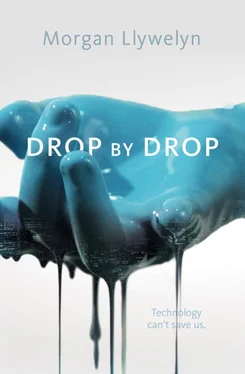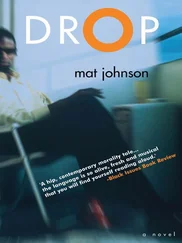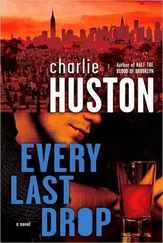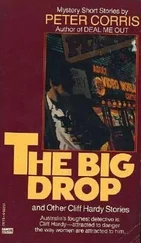Hospitals were struggling; no institutions were more reliant on plastic products. Patients were beginning to die due to failed technology. Medical professionals worked alongside lab technicians trying to discover usable substitutes.
As soon as the problem with stents was realized, doctors began replacing them with thin tubes of steamed and sterilized bamboo. But bamboo was not readily available everywhere. Three-D printers had been used for decades to replicate human organs with a plasticine material, but now some other substance must be found. In the ongoing battle against cancer, oncologists accelerated the development of antibody technology, but it would take time. Scientists who had pioneered the field of synthetic biology using manufactured DNA claimed it would be possible to replace all petrochemicals… within another decade.
* * *
Sycamore River could not decide how it felt about the Nyebergers. At one time RobBenn had provided employment for a number of people and was the pride of the town. That time had passed. Robert Bennett had very few friends to mourn his passing, but his widow was from one of the Old Families and had connections. Those connections could be resented by the less privileged; some thought the Bennetts had gotten what they deserved. In spite of the official report printed in full in The Sycamore Seed, there were rumors of a conspiracy on the part of the Daggett’s Woods Conservancy.
* * *
“The Nyeberger family’s going to sue for damages,” Bea Fontaine informed her nephew. “Dwayne’s been talking about it at the bank, he seems to think he’s going to be rich for life. RobBenn had commercial liability insurance and Bennett carried a large personal liability policy, but I doubt if the combined sums will amount to the fortune Dwayne’s anticipating.”
“That greedy bastard,” Jack said in disgust. “Kick her while she’s down, why not? And especially with Christmas coming up.”
“I don’t think anyone’s expecting a very festive Christmas this year. A lot of my friends are planning to go to church, though. More than usual,” Bea added.
“You think the Change is a ploy on God’s part to get people to pray? Put your glasses back on and don’t look at me like that, Aunt Bea; I was being facetious.”
“Then who do you think is behind it?”
“I’m not sure that’s the right question,” he told her. “Not who, not even what. But why? Why out of all the things on this planet destroy only items made from petrochemicals? It’s too deliberate to be accidental. There’s a cold logic behind the Change if we could figure it out. There must be some clue we’re missing.”
* * *
There were times when Finbar O’Mahony, the late Robert Bennett’s personal attorney, wished he had gone into any other profession. He was thinking that now as he stood at the door of Katharine Richmond’s apartment with his finger poised over the bell.
The balcony across the front of the second-story apartments was an obstacle course of bicycles, scooters and barbecue equipment. Some of the front doors could use repainting, but at least they were made of real wood, which had been considered a luxury detail half a century ago. The majority of doors and window frames used in modern construction were disintegrating. Lumberyards were swamped with more orders than they could handle.
While he waited for someone to respond to the bell O’Mahony noticed the balcony floor in front of the adjacent apartment, where brightly colored plastic toys had dissolved. Red, yellow and blue had flowed outward together to the edge of the wooden balcony, where they presumably dripped onto the ground below.
Yet unless the lawyer’s eyes were playing tricks on him the balcony canted toward the apartment doors. Sagging supports, he guessed.
He took a coin out of his pocket and stood it on edge on the floor.
It rolled downhill. Toward the doors.
The edge of the balcony was uphill.
“What on earth are you doing?” Katharine Richmond asked behind him, breaking his concentration.
He whirled around. “I, ah, was conducting a little experiment, nothing important. May I come in? I need to talk to your daughter. I believe she and the children are staying with you for a while.”
“Indefinitely,” she corrected. “I couldn’t let her go back to that house after the funeral, not even for Christmas. I don’t think she wanted to anyway. I took them all to church with me and then we had a quiet dinner here. It was very pleasant, I found an old Monopoly board and we played games.”
Rob Bennett would have loved that, the attorney told himself.
The Richmond living room was decorated in shades of beige and rose, with no Christmas tree but a slight odor of dog in the air. When O’Mahony sat down on the couch the odor enveloped him. “Nell brought the dogs with her, I assume?”
“Only Sheila and Rocky,” Nell said as she entered the room. “Hello, Finbar. Three dogs would be more than the landlord would tolerate; as it is he’s making a big concession.”
Widow and lawyer faced each other across a low coffee table. A neatly arranged stack of glossy magazines sat in the exact center of the table. There were no flowers, no coasters and no ashtrays. O’Mahony did not disturb the arrangement by adding his briefcase.
The widow was pale and had lost weight; her plain dark dress looked as if it had been bought for someone else. Her hair was outgrowing its style; the roots were showing. She was wearing very little makeup.
“I’m here to fill you in on what’s happening with the Nyeberger situation,” O’Mahony began. “There’s good news and bad, Eleanor; which do you want first?”
“Give me the bad news first, Finbar, and let’s get it over with.”
“I admire your courage. Dwayne Nyeberger’s hired a high-powered legal firm that specializes in industrial compensation, and the accident at RobBenn is right up their alley. If they get what they’re asking for it will clean you out; not only what’s left of the property in Daggett’s Woods but your house and cars, any other investments you and Rob held jointly, probably even your personal jewelry. They’re professional asset strippers.”
“I see. Well, I’m not surprised. And the good news?”
To Nell’s surprise the lawyer’s eyes twinkled. If she did not know better she would have thought he was about to smile. “The Change is the good news,” he said.
“I don’t understand.”
“If this had gone to court a year ago… but this is now. Deeds, trust documents, insurance policies, bank records, the Change is throwing priceless information out the window. Tons of data that was routinely digitized can’t be accessed anymore. In many cases the paper originals have been destroyed; they were thought to be obsolete. Everything was done through the computer, but online is going offline.” He made the last remark with obvious relish.
“Eleanor, I assume you know that the Cloud is the world’s largest information bank, a virtual reality that was supposed to be safe. It’s become the repository for just about everything important. Presumably the information still exists, but the micronized infrastructure is failing and so is the hardware to reach it. All that valuable material, lost in the clouds.” The lawyer smiled at his little joke. “Without access to it lawsuits like the Nyebergers’ are merely fodder for the wastebasket.”
Nell’s eyes brightened. “You mean they can’t…”
“Precisely. Not for years or decades, maybe even centuries. IT engineers are working to circumvent the problem, but they’re not making much headway.” Finbar O’Mahony folded his hands atop the briefcase in his lap. “Nobody’s saying this out loud, but it could destroy the legal profession. Didn’t Shakespeare write, ‘Let’s kill all the lawyers’? I predict chaos in a matter of months. Frankly, I prefer to be well out of it.
Читать дальше









